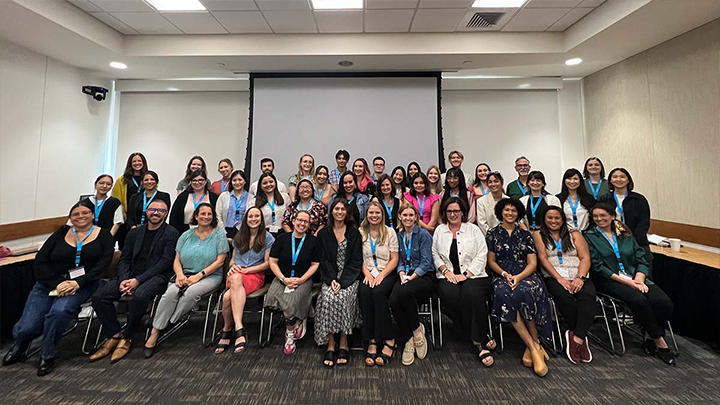San Diego LEND Welcomes Newest Crop of Leaders

When Sara Hassani’s insurance company denied her request to have her neurodivergent child to receive care from a particular provider, she didn’t panic or despair. Instead, she remembered her advocacy training.
Thanks to her experience in San Diego LEND — a federally-funded collaboration between San Diego State University, UC San Diego and Rady Children’s Hospital-San Diego aiming to improve services and care for individuals with autism and other disabilities — she had the confidence to pursue an appeal.
Her health plan’s decision was promptly reversed.
"I was actually empowered to be much more effective in my own life," Hassani said.
More empowerment is on the way.
At the beginning of the Fall semester, San Diego LEND kicked off its third cohort with an orientation at SDSU’s Conrad Prebys Aztec Student Union. Short for Leadership Education in Neurodevelopmental and Related Disabilities, LEND has 60 regionally-based programs nationwide.
The San Diego chapter welcomed 35 new trainees, who will complete between 40 to 300 hours of training activities over the course of the next year. They come from different walks of life and perspectives, which is very much by design. Some come from the service side, including professionals from the medical, mental health and education fields. Others bring lived experience, such as family members of neurodivergent individuals and neurodivergent self-advocates.
“The impact will be at the individual level,” said San Diego LEND co-director Jessica Suhrheinrich, associate professor in SDSU’s Department of Special Education. “Helping people develop skills and confidence around leadership and knowledge of service systems is an important piece. But we're also committed to improving equity and access to care within the variety of different autism service sectors. By training new leaders, some of whom are already working in the field, systems-level change is happening, too.”
The new cohort will participate in weekly seminars on autism and developmental disabilities, as well as leadership development. They will also have the opportunity to do clinical observations through a variety of clinics at Rady, where they will get to witness families receiving services from providers.
Hassani, a graduate of San Diego LEND’s second cohort, was on hand for the orientation to share her experiences with the newcomers.
"The experience was so much more than I ever expected,” said Hassani, who was recently hired as a program specialist for the SDSU Interwork Institute’s Exceptional Family Resource Center to develop training programs.
“I came into it thinking it was going to be more of a lecture series, but what it ended up being was a training program that really focused on creating professional learning opportunities for the trainees — one in which it was bi-directional.”
Mary Gowen, a member of the new cohort, expressed enthusiasm for what lies ahead. A mother of three children — two of whom are autistic — she was recently diagnosed as autistic herself.
“Just from the first few hours of being with this group, I feel so at ease and welcomed,” Gowen said. “The atmosphere of curiosity and collaboration are incredible. I feel so excited to be a part of it.”
A mixed-media artist, Gowen is seeking to learn more to help her better express the autistic experience through her art.
“I feel like I can express my own experience but I don't feel like I have the confidence or authority to express the broad experience of autism and advocate that way yet,” she said. “I would really like to learn more about the entire spectrum."

